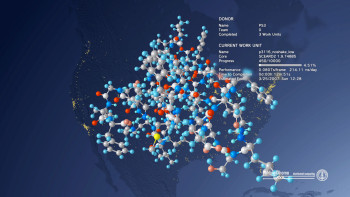
You can now help cure diseases like Alzheimer’s while you sleep using your phone
Interested in the prospect of contributing to disease study and research for doing nothing but owning a smartphone? Sony’s making that a reality for owners of their Xperia phones thanks to the launch of the new Folding@Home mobile app.
If you’re not aware, Folding@Home began as a project that would help supplement the protein folding simulations being carried out by Stanford’s research teams to try and cure diseases like Alzheimer’s. The purpose of the study is to simulate and analyze the process of a protein folding in order to understand what goes wrong in the folding process that leads to the unfortunate development of these diseases in people.
It’s their hope that the project will help speed up research without having to spend tons of money on supercomputer farms or having to spend countless man hours inside a research lab to study actual organisms (which is quite difficult due to how quickly the folding process for a protein takes place — less than millionths of a second for most proteins).
Sony first showed support for the project with their PlayStation 3 gaming console. The app — dubbed Folding@Home — allowed users to “donate” processing time to the cause. The data would then be uploaded to a central database for the Stanford team to collect from. This gave them far more processing power than they could hope for and allowed them to break records for folding simulations.
Now they hope to do it all over again in mobile. The team has been working on the app for a couple of years now, and are comfortable enough with the powerful processing capability of smartphones and the stability of their app to release it in beta form.
A member of the Folding@Home team — Dr. Vijay Pande — says they would need about 150,000 “phone days” to be able to publish the next big paper on protein folding and Alzheimer’s research. A “phone day” is described as one phone running 24 hours per day, 7 days per week in a year. With just 10,000 phones contributing a full phone day, he says that mark could be reached in a matter of just a couple of weeks.
- The phone has to be connected to a charger and fully charged to 100%
- The phone must be connected to a WiFi network
- The phone must meet the previous conditions with a specific set of time which you set.
Then, and only then, will Folding@Home siphon off some of your phone’s processing power to carry out the simulation. Those aren’t the most ideal stipulations for most folks. That’s why Sony suggests letting your phone carry the simulations out as you sleep every night. Your phone is plugged in, after all, and you probably aren’t going to be needing your phone for much of anything else while you’re in your nightly temporary coma.
Sony also stresses that they and Standford University have looked into potential security risks, and have assured us that Folding@Home does not, in any way, interface with any other app’s data, the phone’s memory or anything other than raw processing power and your WiFi connection for transmitting data.
Heard enough? Sony Xperia owners can head to the Google Play Store right now for their download, though those outside of the Sony camp will have to wait until the app exits beta at some point in early 2015 before they can contribute some processing time to a very important cause (granted they have a phone with an ARM processor and at least Android 4.4 KitKat).
[via Sony]